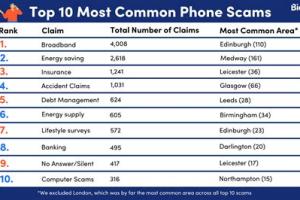Identifying and Avoiding Common Scam Phone Numbers & Area Codes

-
Quick Links:
- Introduction
- Understanding Phone Scams
- Common Scam Numbers
- Area Codes to Avoid
- How to Protect Yourself
- Case Studies: Real-Life Scam Examples
- Expert Insights on Phone Scams
- Data Analysis: Scam Trends
- FAQs
- Conclusion
Introduction
In today's fast-paced world, phone scams are becoming increasingly sophisticated and prevalent. Scammers utilize various tactics, often leveraging technology to appear legitimate. This article will delve into common scam phone numbers and area codes to avoid, equipping you with the knowledge to protect yourself from fraud.Understanding Phone Scams
Phone scams come in various forms, including robocalls, phishing attempts, and fraudulent telemarketing. Understanding these types can help you identify potential threats early.Types of Phone Scams
- Robocalls: Automated calls that deliver pre-recorded messages.
- Phishing: Calls pretending to be from legitimate organizations to steal personal information.
- Telemarketing Scams: Fraudulent sales offers, often for products or services that don't exist.
- Imposter Scams: Callers impersonating government officials or law enforcement.
Common Scam Numbers
Certain phone numbers have been repeatedly reported as scams. Here are some of the most common ones:| Scam Number | Type of Scam | Reported By |
|---|---|---|
| 800-555-0199 | IRS Tax Scam | Consumer Reports |
| 866-555-0123 | Credit Card Fraud | FTC |
| 877-555-0101 | Tech Support Scam | Better Business Bureau |
Area Codes to Avoid
While no area code is inherently a scam, certain codes have been associated with fraudulent activities. Here are some area codes often linked to scams:- 900: Premium-rate numbers that can charge you significantly.
- 809: Known for fraudulent long-distance calls.
- 876: Often associated with lottery scams.
How to Protect Yourself
Protecting yourself from phone scams requires vigilance and proactive measures. Here are steps you can take:Step-by-Step Protection Guide
- Do Not Engage: Avoid responding to unknown numbers.
- Use Call Blocking Apps: Consider apps that identify and block spam calls.
- Report Scams: Report suspicious numbers to the FTC or your local consumer protection agency.
- Educate Yourself: Stay informed about the latest scams and their tactics.
Case Studies: Real-Life Scam Examples
Understanding real-world examples can help clarify how scams operate.Case Study 1: The IRS Scam
In this scenario, a victim received a call from someone claiming to be an IRS agent. The scammer threatened legal action unless immediate payment was made. The victim, fearing repercussions, transferred funds, only to realize later it was a scam.Case Study 2: Tech Support Fraud
A computer user received a call from a "Microsoft technician" who claimed their computer was infected. The caller offered to fix the issue for a fee. The victim, believing the call was legitimate, provided remote access to their computer and ended up with identity theft.Expert Insights on Phone Scams
Experts in consumer protection emphasize the importance of skepticism. Dr. John Smith, a consumer behavior specialist, notes that "scammers exploit fear and urgency to manipulate victims into acting quickly."Data Analysis: Scam Trends
According to the FTC, there has been a significant rise in reported phone scams over the past five years. In 2022 alone, over 3 million complaints were filed regarding phone scams, with losses exceeding $1.5 billion.FAQs
Frequently Asked Questions
- What should I do if I receive a suspicious call? Hang up immediately and do not provide any personal information.
- How can I identify a scam call? Look for red flags such as high-pressure tactics or requests for personal information.
- Are there apps that can help block scam calls? Yes, apps like Truecaller and Hiya can help identify and block spam calls.
- Can I report scam numbers? Yes, report to the FTC or your local consumer protection agency.
- What are some common signs of a scam? Unsolicited calls, threats, and requests for payment via unusual methods.
- Is it safe to call back unknown numbers? No, avoid calling back as it may lead to further scams.
- What area codes should I be wary of? Area codes like 900, 809, and 876 are often associated with scams.
- How can I educate myself about scams? Follow consumer protection websites and news outlets for updates on scams.
- Are text scams common? Yes, text scams are increasingly common; always verify before clicking links.
- How can I protect my family from scams? Share information about scams and encourage open communication about suspicious calls.
Conclusion
Awareness is your best defense against phone scams. By recognizing common scam numbers and area codes, you empower yourself to navigate the digital landscape safely. Stay informed, be cautious, and protect your personal information to avoid falling victim to these fraudulent tactics.Random Reads
- Unlock iphone without computer
- Unlimited cash bounty nfs most wanted
- How to turn on keyboard light dell
- How to turn on nfc for iphone
- How to unlock a safe
- How to uninstall nvidia drivers windows 10
- How to paint over silicone caulk
- How to paint stainless steel
- How to mirror your macs screen to apple tv
- Mastering image resizing paint dot net